

Design Thinking & Beyond. Institut interdisciplinaire d’anthropologie du contemporain - Centre Edgar-Morin. The Process of Solving Complex Problems. Think Academy – The World Of Systems Thinking. A visual exploration on mapping complex networks. Crowd Management, Crowd Modelling, Crowd Behaviour. Social Complexity & Uncertainty. Take a Test. On the next page you'll be asked to select an Implicit Association Test (IAT) from a list of possible topics . We will also ask you (optionally) to report your attitudes or beliefs about these topics and provide some information about yourself. We ask these questions because the IAT can be more valuable if you also describe your own self-understanding of the attitude or stereotype that the IAT measures.
We would also like to compare differences between people and groups. Data Privacy: Data exchanged with this site are protected by SSL encryption. Project Implicit uses the same secure hypertext transfer protocol (HTTPS) that banks use to securely transfer credit card information. Important disclaimer: In reporting to you results of any IAT test that you take, we will mention possible interpretations that have a basis in research done (at the University of Washington, University of Virginia, Harvard University, and Yale University) with these tests. Take a Test. Iterated Prisoner's Dilemma Game and Simulation. CS-DC Complex System Digital Campus. NetLogo Web. NetLogo Home Page. NetLogo is a multi-agent programmable modeling environment.
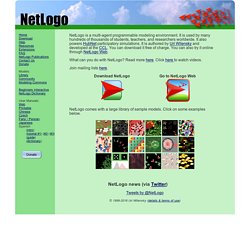
It is used by many hundreds of thousands of students, teachers, and researchers worldwide. It also powers HubNet participatory simulations. It is authored by Uri Wilensky and developed at the CCL. You can download it free of charge. You can also try it online through NetLogo Web. What can you do with NetLogo? Join mailing lists here. Groningen Center for Social Complexity Studies. How interactions between individual people or animals give rise to group phenomena such as the diffusion of new behaviours, social networks, societial polarisation, crowd behaviours and spatial arrangements is the key question around which researchers from the GCSCS gather.
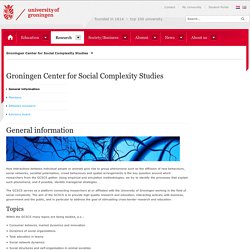
Using empirical and simulation methodologies, we try to identify the processes that explain such phenomena, and if possible, identify managerial strategies. The GCSCS serves as a platform connecting researchers at or affiliated with the University of Groningen working in the field of social complexity. The aim of the GCSCS is to provide high quality research and education, interacting actively with business, government and the public, and in particular to address the goal of stimulating cross-border research and education. Weather and climate change. Knight, Risk, Uncertainty, and Profit.
Small World Theory. Explanations > Theories > Small World Theory Description | Research | Example | So What?

Synthesis. Complexity Science. Airports of the Future. Linda Booth Sweeney. Systems change.
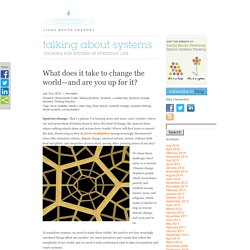
That’s a phrase I’m hearing more and more. And I wonder, where our next generation of leaders learn to drive this kind of change, the systems kind, where nothing stands alone and actions leave tracks? Where will they learn to connect the dots, discovering as they do force multipliers among seemingly disconnected issues like education reform, climate change, electoral reform, racism, violence both local and global, and inequities of every kind, among other pressing issues of our day?
We know these challenges don’t occur in a vacuum. Climate change displaces people, which exacerbates poverty and conflicts among classes, races, and religions, which makes it harder to stop or reverse climate change, and so on and so on. To transform systems, we need to make them visible. My hope for any anyone who wants to change the world is this: Understand in your bones what Martin Luther King called the “interrelated structure of reality.”
In some ways, this shouldn’t come as a surprise. Insight Maker. Kumu. The Perspectives Project. Systems Thinking Games. Systems Thinking Games, developed in partnership with Filament Games, are designed to be used by youth and educators to assess systems thinking skills both in the classroom and in afterschool contexts.
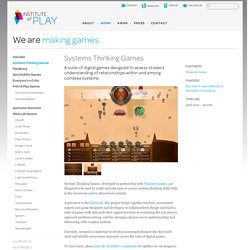
A precursor to the GlassLab, this project brings together teachers, assessment experts and game designers and developers to collaboratively design and build a suite of games with data tools that support teachers in evaluating the way players approach problem-solving, and the strategies players use in understanding and interacting with complex systems. Currently, research is underway to develop assessment frameworks that yield valid and reliable assessment measures across the suite of digital games. To learn more, please join the Institute’s community for updates on our progress. Linda Booth Sweeney > Learning About Systems > Tools & Techniques for Learning About Systems > Experiential Exercises. “As corporate trainers and authors of books for trainers, we keep a lookout for quality and innovation in our field.

The Systems Thinking Playbook is a handy three-ring binder filled with interactive lessons that breathe life into systems theory. These clear lesson plans make sometimes intimidating concepts accessible and can inspire course designers to strike off in their own creative directions. What Is Systems Thinking?: Interactive Components of Video Games Are Perfect Examples. “Why didn’t we do this sooner?”

This question was posed by a student at Franklin High School in Portland, Oregon, who was failing Diana Fisher’s math class. Many people dislike math because it is so abstract and just not a natural way to think about problems, Fisher candidly admits. So she’s on a constant quest to make it easier for her students. She found the answer by integrating a systems thinking model into her classroom.
Isee systems's simulations - Forio Simulate. Please install Flash. LadderofInference. Systems Thinking Resources - The Donella Meadows Institute. Systems Thinking Spring Book Sale!
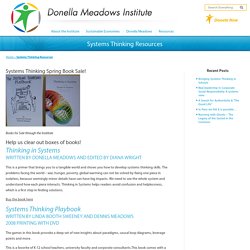
Books for Sale through the Insititute. Systems thinking and practice - OpenLearn - Open University - T551_1. Isee systems - The World Leader in Systems Thinking Software. What Is Systems Thinking? - Waters Foundation. Systems Thinking - Tool/Concept/Definition. Definition Lack of systems thinking produces a mental model based mostly on what you can physically see.
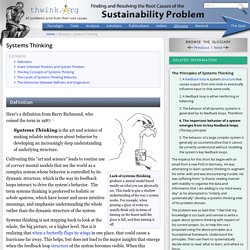
This tends to give a shallow understanding of the way a system works. For example, when pouring a glass of water we usually think only in terms of turning on the faucet until the glass is full, and then turning it off. Here's a definition from Barry Richmond, who coined the term in 1987: Systems Thinking is the art and science of making reliable inferences about behavior by developing an increasingly deep understanding of underlying structure. Cultivating this "art and science" leads to routine use of correct mental models that see the world as a complex system whose behavior is controlled by its dynamic structure, which is the way its feedback loops interact to drive the system's behavior. Systems thinking is not stepping back to look at the whole, the big picture, or a higher level.
Here is a definition from Peter Senge's highly influential The Fifth Discipline Fieldbook: Activités - Chaire Edgar Morin de la Complexité. Le programme des activités de la chaire Edgar Morin de la Complexité doit permettre : d’interroger le sens de la complexité du point de vue des disciplines de gestion et de quelques problématiques directrices des préoccupations de l’ESSEC (entrepreneuriat, business in society, etc).d’expliciter les enjeux de l’appréhension d’un environnement interne et externe complexe pour les praticiensexaminer les méthodes d’approche et de traitement de la complexité sur le terrainde considérer les qualités, compétences, savoir-faire requis pour gérer la complexité au sein des organisations sur les plans du management et du leadership individuel et collectif Quelques activités de la chaire dans ce contexte : les « Mises en boîtes » : présentation par des professeurs de l'ESSEC de leur vision et compréhension de la complexité au travers de certains de leurs résultats de recherche.
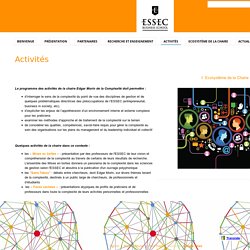
Complexity Explorer.